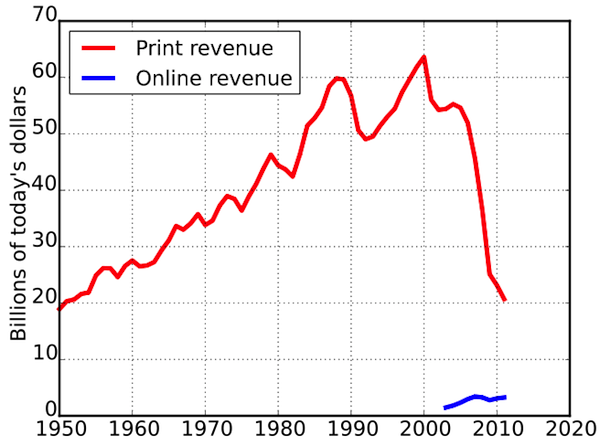In a blog post published last week by marketing giant HubSpot, CMO Mike Volpe explained why he hired a former editor at Newsweek. The post examines why more and more journalism graduates are moving to the world of marketing:
The traditional advertising model is broken. It used to be that if you were a top-tier journalist like Dan, you went to work at a world-class publication (like Forbes), and that would pay you a nice salary because they sold a lot of ads at good prices that were placed around your content. Yet newspaper print advertising revenue is currently less than half of what it was in 2006, and losses in print currently outpace digital advertising revenue at a rate of 10:1.
Simply put, the advertising revenue stream that used to support traditional journalism is trending sharply downward. And with consumers tapping into even more tools to block out and avoid advertising, the downward spiral is only growing. This is why Dan was interested in getting out of the media industry and working for a software company.
This development at HubSpot comes on the heels of Andrew Sullivan’s new interest in paid content and advertorials on sites like Buzzfeed. Sullivan has recently been attacking “advertorials” and how paid pieces from specific companies are not always distinguishable from the rest of a site’s journalistic content.
The thing these two developments share is that in both cases we’re talking about the erosion of conventional just-the-facts journalism and its replacement with paid content that is either disguised to look like conventional journalism (as at Buzzfeed) or is explicitly intended as marketing material (as at HubSpot). Of course, the other commonality with both cases is that they both exist because of the failure of traditional journalism’s revenue model.
If advertising revenue was still strong, journalists like Daniel Lyons would still be at Newsweek and online hubs like Buzzfeed probably wouldn’t be using advertorials. But the traditional financial model that sustains journalistic work is broken due to a mixture of the slow death of print media and the general ineffectiveness of traditional advertising. And no one has quite figured out how to make traditional journalism financially viable without using that traditional advertising model. Sullivan’s entirely reader-funded approach is one option and it’s working for him, but will it work for less famous journalists?
The big question this shift raises is what impact this will have on the way writers write and the rest of us read. Specifically, what happens when the majority of the content available to us online isn’t being paid for by a traditional journalistic enterprise and is instead being paid for by a large company advertising their wares? I can’t see any scenario in which people will stop reading online, but what happens when the stuff we’re reading is coming more often from companies like HubSpot or even paid advertorials on Buzzfeed rather than the seemingly more trustworthy newspapers and magazines whose sole purpose is, we think, to relay the news to us? It’s not hard to imagine some scifi writer dreaming up a dystopian future in which the corporations regulate all the information available to the masses through their control of media.
That said, I wonder if the split between traditional journalism and paid content is as clear cut as Sullivan and others make it out to be. The daily newspaper is dying out, as are reporting-based magazines like Time and Newsweek. The journalistic projects that are thriving are less about news reporting and more about news analysis. Fox News is doing well, as is MSNBC. So is the Huffington Post and Red State. In other words, media sources that do analysis of the news and push a particular political or social agenda have a future. But media sources that simply tell us what happened? Not so much. What this means is that we’re not really talking about “objective reporting of facts by reputable journalists” vs. “manipulative paid content that alters stories to get sales.” We’re simply talking about one product versus another. Fox News sells right wing politics, HubSpot sells marketing software, and a Buzzfeed advertorial paid for by Virgin Mobile sells Virgin Mobile’s products.
The issue, then, isn’t one of objective reporting versus smarmy sales manipulation. It’s far more subtle than that. It’s about the commodification of the written word and the impact of that commodification on the reading public. Implicitly, it’s also about the ways that writers are compensated for their work. Which means what we need is fewer good vs evil debates and more realistic conversations about these tremendously complex subjects.
[Image of Advertising Revenue Courtesy of Wikipedia]













